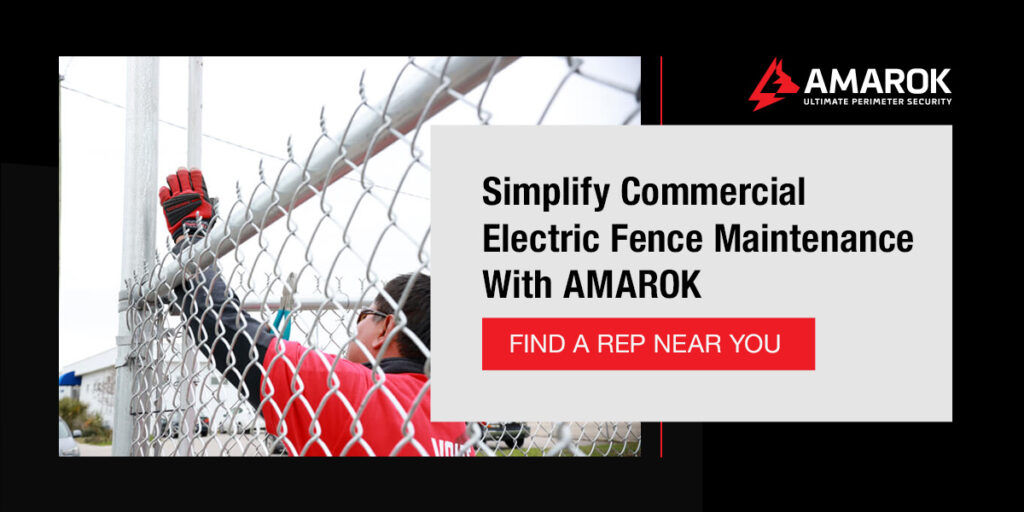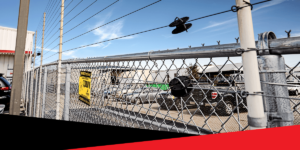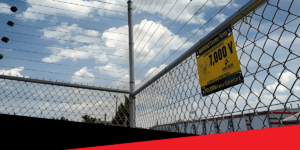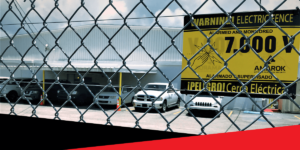Electric fences are instrumental protection solutions for many businesses, from busy airport parking lots to sprawling manufacturing and distribution facilities. They’re a key element of an effective security strategy, providing a physical barrier and medically safe shock to deter and delay a breach. Regular upkeep will help you keep this system at its best, maximizing return on investment and upholding peace of mind.
Why Is Electric Security Fence Maintenance Important?
Maintaining your electric fence is critical to ensuring its appearance, function, and integrity.
Well-kept electric fences can make a good impression on customers, employees, and visitors. By keeping your fence looking its best, you create a positive perception and foster confidence in security. Plus, your perimeter barrier sends the message that you take security seriously, deterring would-be thieves.
Beyond aesthetics, a well-maintained fence promotes safe and reliable operation. Without upkeep, system components could loosen, break, or rust. Poles can bend or become unstable, affecting structural integrity. These issues can cause an inoperable fence, which could lead to negligent security claims and tarnish your hard-earned reputation.
Partnering with a security-as-a-service provider is an excellent way to prevent these issues and stay confident in your barrier’s function and condition. Under this approach, your electric fencing’s upkeep is in expert hands and included in your monthly subscription price.
Electric Security Fence Maintenance Checklist
You can take multiple steps on your own to help keep your fence in its best condition and protect your investment. If you notice issues, always follow the manufacturer’s recommendations for repair or contact a skilled technician for assistance.
Conduct a Daily Structural Inspection
Your fence’s structural components form its backbone and empower its safe, accurate operation. These traits make them the priority for regular inspection. You should disarm the system and walk the perimeter fence daily to visually check:
- The energizer: This part is crucial for power and energy conversion. Examine its connection to the power supply and the fence to ensure it’s not corroded or loose.
- Power supply: Check whether your batteries are holding an adequate charge or need replacement. If using solar-powered options, inspect the photovoltaic panels for any defects or cracks.
- Insulators: Insulators can “dry out” and crack with excessive UV exposure. A malfunctioning or broken insulator can ease tension on the fence strands, allowing them to contact the posts. If a strand touches a metal post, the fence will not function properly.
- Wires: Due to their constant tension, it’s natural for wires to loosen at the springs as time passes. If you see excessive sagging or twisting, a tension adjustment is likely necessary to preserve performance.
- Wire connections: Wildlife and high-wind events can cause loose connections and faults. Ensure all wires appear securely connected.
- Fence strands: Frayed, corroded, or abraded strands can stop current from passing through properly, limiting the effectiveness of the fence’s safe shock.
- Fence posts: Posts should stand upright and resist movement. An unstable or leaning post will require correction to maintain accurate tension.
- Wire poles: If your system has additional wire poles for support, these should also be stable and upright to prevent sagging.
- Signage: Warning signs provide a visual deterrent for would-be intruders and may be legally required to display in many jurisdictions. Check that yours are visible and firmly secured to the fence.
Check the Voltage Regularly
Low voltage is a common cause of performance loss, underscoring the importance of routinely checking it. These faults can result from:
- Abraded, frayed, or broken wires
- Short circuits
- Vegetation touching the fence
- Broken insulators
- Bent or broken poles

One way to uncover a voltage problem is to listen carefully as you walk the perimeter. A fault often produces an audible snapping sound that results from arcing. Trace the noise to its source and inspect the fence for the root cause, such as something touching the system. Never use your bare hands to remove anything metal from the fence with the voltage on.
A digital voltage meter can also help you find potential voltage leaks needing repair. Systematically test each fence section to identify where an issue is and what may be creating it.
Control Nearby Vegetation
Nearby vegetation poses challenges to safe and effective electric fence operation. Similar to a human or animal contacting the fence, vegetation can easily complete the circuit. Continuous touching leads to consistent current, which wastes electricity and raises operational costs. Worse, the extra drain can cause a weaker current further along the system, reducing efficacy. Leaves can also attract and hold water, which may lead to a short circuit if the excess moisture contacts the fence.
Incorporate vegetation management into your maintenance plans to keep the fence line clear before faults arise. Doing so is especially important during peak growth seasons.
Consider Seasonal Weather Changes
As with vegetation, the weather introduces elements that can affect your electric fence’s performance and effectiveness.
For example, charges can weaken as the soil freezes since the moist ground is more conductive. The possibility of freezing temperatures means monitoring and cleaning power sources and sensors during the late fall and winter. Autumn leaves or winter precipitation can gather on solar cells or sensors and impact their ability to charge.
Additionally, heavy frozen precipitation adds weight, which can cause wires to sag or weaken their connection. Clear snow and ice as soon as possible following a weather event to prevent damage and maintain performance.
Summer’s heat may bring powerful thunderstorms, so check for limbs, branches, or debris caught in the fence after high winds. Items that lodge in the fence add load, putting extra strain on the charger. If not promptly removed, this debris can also result in a short circuit.
Preventive Electric Fence Maintenance Helps Protect Your Property and Assets
Your electric fencing system is an investment in your property’s security and protection. Staying current with upkeep and repairs will maximize its value and function.
Continued Performance, Safety, and Compliance
A well-maintained electric fence is always ready to do its job — legally safeguard assets and property within and keep unwanted intruders out. Regular maintenance ensures:
- Your fence is stable.
- The current runs accurately and without excessive, costly drains on the system.
- The components are in good condition and free of damage or corrosion that could interfere with performance.
- The system is free of weak voltage or leaks.
- You have visible, compliant warning signage.
- The fence performs safely and alarms as intended with an attempted breach.
Faster, Cost-Effective Repairs
Routine fence inspections help ensure you discover potential maintenance and repair issues faster so you can address them promptly. Having confidence in the function of your fence is the best way to preserve your peace of mind. If you’re financially responsible for fixing the fence, finding and addressing challenges quickly also saves you money by preventing smaller repairs from becoming larger, more expensive ones.
Simplify Commercial Electric Fence Maintenance With AMAROK
Regular fence maintenance helps your security investment perform at its best and greatly reduces the risk of costly future repairs. AMAROK simplifies this task with a security-as-a-service model. We offer our electric fencing solutions with a convenient monthly subscription that includes expert maintenance and repair. Our systems deliver proven, effective security with a medically safe and legal 7,000-volt shock during an attempted breach.
We partner with thousands of nationwide businesses in many industries, with 99% experiencing no external theft after installation. Let’s discuss how we can help you be proactive with a customized multilayer security solution. Connect with us online or find your nearest perimeter security expert to get started.





